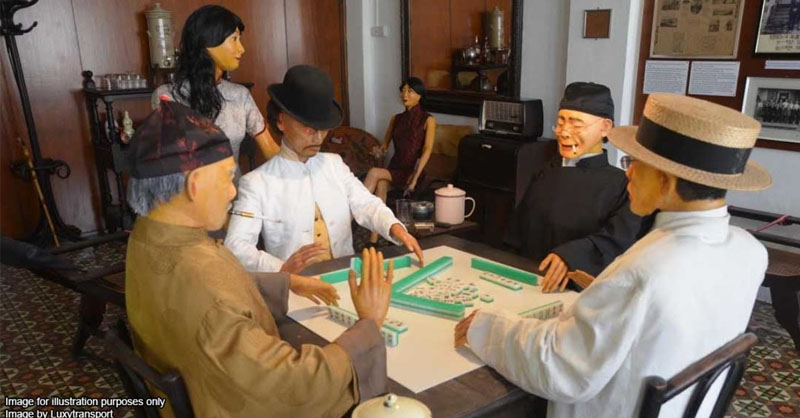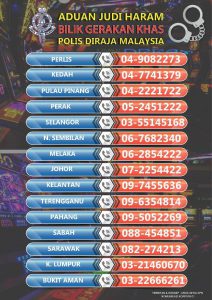Is it illegal for Malaysians to gamble at home?

There’s the common perception that gambling is illegal in Malaysia, and that’s true to a large extent. There are exceptions, like the casinos up in the Genting Resorts, and the good ol’ Toto, Magnum and Damacai that have licenses granted by the Minister of Finance. Did you also know that illegal gambling dens exist in Malaysia? The police were active in cracking down on these gambling dens at the end of last year. We’ll soon find out that not only can the patrons be charged with a crime, but the owners can be, too.
Now that Chinese New Year is around the corner, we’re pretty sure that there’s gonna be an increase of “chor dai di” playing among family and friends. What are the laws that govern gambling in Malaysia, and can you be arrested for a friendly game of poker in your own home?
Your house can be a gambling den, according to Malaysian law

Even if it’s just a friendly wager. Img by Any5354.com
Before we get into the nitty gritty, we gotta get something out of the way first. Malaysia has two main laws concerning gambling: the Common Gaming Houses Act 1953 and the Betting Act 1953, centered around the concepts of “common gaming houses” and “betting houses” respectively. A betting house is where people place bets on things like horsing races or sports events and organize illegal lotteries. A common gaming house is more relevant to our discussion in this article, because common gaming houses are places that host more “casino-like” games like roulette and poker.
That’s why from now onward, we’ll almost exclusively refer to the Common Gaming Houses Act 1953. Section 3 of the Common Gaming Houses Act 1953 straight up declares these houses as nuisances and are “contrary to the law”. Their existences are not tolerated at all by the authorities.
With that out of the way, Section 4 of the Common Gaming Houses Act 1953 sets out offences that relate to owning or occupying the common gaming house. The section has a few subsections, we’re just gonna have a taster here:
4. (1) Any person who— (a) being the owner or occupier or having the use temporarily or otherwise thereof keeps or uses a place as a common gaming house; or
It’s supposed to be a catch-all subsection that is targeted at anyone who might be operating an illegal gambling den. Some examples of offences under section 4 include owning or occupying common gaming houses, and publishing advertisements for the gaming house, and the like. Offenders can be liable for a fine between RM 5,000 and RM 50,000 AND a jail term of up to 3 years, with additional punishment for each gaming machine (like slots or the roulette).
What if the someone doesn’t own a betting house, but is akin to an ‘investor’ of the common gaming house? Section 5 states:
5. Any person who advances or furnishes money for the purpose of establishing or conducting the business of a common gaming house or for the purpose of a public lottery or who profits from the establishment or conduct of such business shall be guilty of an offence…
These investors commit an offence by funneling money into the establishing and the conducting of a common gaming house. Not even people who make or supply gaming machines are spared. Section 4a says that anyone who deals in or manufacturers or assembles gaming machines (it can be gambling equipment, or those gambling arcade machines, or slot machines) commits an offence, and can be punished with a fine between RM 10,000 and RM 100,000 and a jail term of up to 5 years.
It can be difficult to catch gambling dens in action, so to facilitate the process of capturing common gaming houses, Malaysian authorities are allowed to make certain presumptions regarding certain facts. For example, section 19 of the Common Gaming Houses Act 1953 allows the assumption to be made that if a house or a premise has materials that allow for gaming/gambling, and operates as a common gaming house would, it is a common gaming house until proven otherwise.
An example would be if a house has a couple of slot machines, a poker table and decks of poker cards, maybe a stash of poker chips, it would be assumed that this house is a common gaming house. It doesn’t have to look straight up like a casino, as long as it looked like gambling was being done, the house or premise may be regarded as a common gaming house. That’s why…
Yes, you can be arrested for gambling even in your own home
Now we come to the actual offence of participating in gambling in a common gaming house. According to section 6(1) of the Common Gaming Houses Act 1953, anyone who games in a common gaming house is guilty of an offence, and shall be punished with a fine of up to RM 5,000, a jail term of up to 6 months, or both. Gaming is defined in section 2 as:
…the playing of any game of chance or of mixed chance and skill for money or money’s worth and includes the playing of any game specified in Column I of the First and Second Schedules and the playing or operation of any gaming machine…
Gaming can mean many of the common gambling games such as poker, blackjack, and roulette, but the First and Second Schedule of the Act has a list that include some of the less commonly known games, like “Tau Ngau” and “Ewok” (Not to be confused with the Ewoks from the Star Wars movies).
It’s also an offence to gamble in public, according to section 7(1) of the Common Gaming Houses Act 1953.
7. (1) A police officer may arrest without warrant any person found gaming in any public place and may seize all instruments or, appliances for gaming found in such public place or on the persons of those arrested under this section.
In fact, the cops can arrest you and your friends without a warrant if you play blackjack in public. They’ll confiscate your deck of cards, too. Anyone liable for gaming in public may be fined up to RM 5,000, imprisonment of up to 6 months, or both. Even if you were gambling without money but other items at stake (maybe a phone, or a watch) or even if you use things to represent money (like peanuts), it still counts, as stated in section 7(3).

“Oi you still owe me 50 peanut shells right?” Img by Any5354.com
You might be wondering if the police need a warrant to search premises or people that they think are common gaming houses or patrons, respectively. They do in fact require warrants to raid suspected gambling dens or gamblers. According to section 16 and 17 of the Common Gaming Houses Act 1953, if a Magistrate, or Justice of Peace or a senior police officer receives written reports of a suspected premise or person, they may make any enquiries that are necessary. These figures of authority may then issue a warrant to enter and search premises, and/or search individuals and seize anything that is connected to gambling.
In addition to the secular laws stated above, the Muslim community in Malaysia are also subject to Syariah law, which is documented in the Syariah Criminal Offences Enactment 1996. These Syariah laws vary from state to state, for example, the Syariah Criminal Offences (State of Penang) Enactment 1996 holds that if a Muslim is caught gambling, they can be subjected to a fine up to RM 3,000, imprisonment of up to 2 years, or both. In Pahang, a Muslim’s mere presence in a place for gambling warrants the same punishment.
There are minor differences in each state’s Syariah enactments on gambling, and each state has an Islamic Religious Affairs Department, whom among other agencies, enforces Syariah law. Even Muslim tourists are subject to these laws.
Here’s how you can report illegal gambling

To sum everything up, if you and your friends and family play poker at home and there’s money (or other valuables at stake):
- Your house is technically considered a common gaming house, in that period of gambling
- You and your friends and family who participated in the poker game that involved money have technically violated section 2
- Unless you’re using tokens like peanuts for fun and don’t actually exchange them for cash later, you could get into trouble with Section 7(3).
But wait, there’s more! You’re technically not breaking any Malaysian laws if you gamble online, because it’s still a bit of a grey area within the law, BUT a judge did find a Sabahan man guilty of online gambling and sentenced him to a fine of RM1,100 or two month’s jail time for online gambling, so… safety first, eh?
Anywho, The PDRM have released a list of phone numbers that you can report illegal gambling to, with thanks to our friends over at the Enforcement Agency Integrity Commission for sharing it. Oh, and we’ll leave you with a piece of trivia: There is one other place than Genting Highlands that has a gambling license, and would you believe it, it’s in Ipoh. The Han Chin Pet Soo was a clubhouse for Hakka Chinese miners and it was kind of like an old timey Zouk but with more debauchery. The clubhouse was known to play host to vices like gambling, prostitution, opium consumption and the triads.
[This article was originally published on Asklegal.my. Despite being a popular legal resource for the general public, a legal site isn’t particularly attractive for sponsored content clients.
Purely for financial reasons, we made the difficult decision to shut Asklegal down and host the articles on Cilisos; both to recognize the work put in by the team over the years and because we believe that they’re still beneficial to many Malaysians.]









